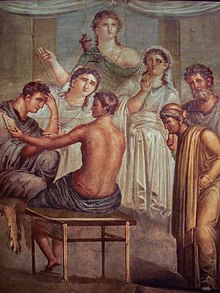
Back Алкестида Bulgarian Alcestis (Eurípides) Catalan Alkéstis (divadelní hra) Czech Alkestis (Euripides) German Άλκηστις (Ευριπίδη) Greek Alcestiso Esperanto Alcestis (obra) Spanish Alkestis (Euripides) Finnish Alceste (Euripide) French Alkêstis (toanielstik) Frisian
| Alcestis | |
|---|---|
 | |
| Written by | Euripides |
| Chorus | Old men |
| Characters | Apollo Thanatos / Death Maidservant Alcestis Admetus Eumelus Heracles Servant Pheres |
| Date premiered | 438 BC |
| Place premiered | Athens |
| Original language | Ancient Greek |
| Genre | Tragedy |
| Setting | Pherae in Thessaly |
Alcestis (/ælˈsɛstɪs/; Greek: Ἄλκηστις, Alkēstis) is an Athenian tragedy by the ancient Greek playwright Euripides.[1] It was first produced at the City Dionysia festival in 438 BC. Euripides presented it as the final part of a tetralogy of unconnected plays in the competition of tragedies, for which he won second prize; this arrangement was exceptional, as the fourth part was normally a satyr play.[2] Its ambiguous, tragicomic tone—which may be "cheerfully romantic" or "bitterly ironic"—has earned it the label of a "problem play."[3] Alcestis is, possibly excepting the Rhesus, the oldest surviving work by Euripides, although at the time of its first performance he had been producing plays for 17 years.[4]
© MMXXIII Rich X Search. We shall prevail. All rights reserved. Rich X Search